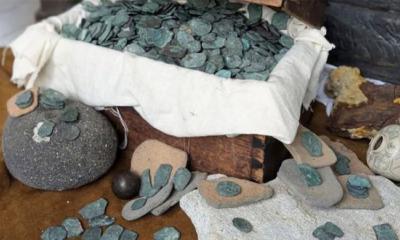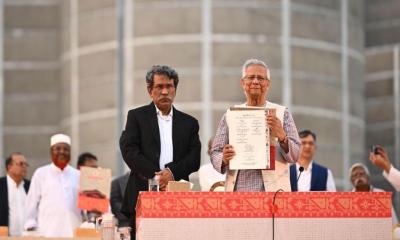With its seductive aroma, deep-red colour and spicy flavour, Jollof rice is the undisputed queen of West African kitchens. It's our beloved culinary treasure and a dish from our very heart and soul. But just whisper the word "Jollof" in West Africa and you could easily start a fiery feud of passion. That's because determining which West African nation makes Jollof best is an ongoing matter of local pride and contention, reports BBC.
Jollof rice is to West Africa what paella is to Spain, risotto to Italy, biriyani to India and fried rice to China. As a child growing up in Ghana, I gobbled Jollof down at family gatherings, birthdays, coming-of-age ceremonies, engagement parties and weddings. Enjoyed as a main meal, this rich, mouth-watering dish consists of rice cooked in a flavourful sauce of tomatoes, onions and aromatic spices. These base ingredients are often layered with ginger, garlic, thyme, grains of selim (a West African spice), tomato puree, curry powder and Scotch bonnet chillies, though the exact components and preparation differ from country to country; even from house to house.
While each plate of Jollof may vary, every one brings exciting flavours. The savoury sweetness of onions is very important. Seasoning is crucial. And the choice of meat – mutton, beef, chicken, goat, lamb or even fish – delivers a different deliciousness every time. The meat is spiced and delicately braised in stock until tender, before being fried and returned to the stock. Then the rice is added to the meat, stock and spicy sauce and simmered until it absorbs all the flavoursome liquid, leaving every grain aromatic, delectable and a luscious orangey-red hue. The origins of Jollof rice can be traced to the 1300s in the ancient Wolof Empire (also called the Jolof Empire), which spanned parts of today's Senegal, The Gambia and Mauritania. Rice farming flourished in this region, and Jollof began life as a dish called thieboudienne, prepared with rice, fish, shellfish and vegetables. As the empire grew, the Wolof people dispersed across the region and settled in different parts of West Africa, taking their sumptuous rice dish with them.
Despite its ubiquity across the region, few foods have caused as much of a stir as Jollof rice. Today, every West African country has at least one variation of Jollof, which both divides and unites the region. Each nation and family add their own twist and interpretation, which perhaps is the root of the fierce competition taking place across social media, parties and street-side chats. Black Foodie website, which explores food and culture through a black lens, described it as "one of the most interesting and heated food debates amongst the diaspora… it's the most epic food beefs of all time."
The main protagonists in a steam over who makes the best Jollof rice are Ghana, Nigeria, Sierra Leone, Liberia and Cameroon. The Gambia and Senegal are quite laid-back and rarely enter the Jollof controversy; after all, they gave it to the world. Myriad variations fuel the ongoing competition with as many similarities as there are differences; and with oral traditions of passing down recipes, what else could be expected?
For instance, my Ghanaian mother would stew the rice with the sauce and meat in a one-pot dish, which is, of course, my favoured preparation. Nigerians and Liberians sometimes use palm oil instead of vegetable oil to give a richer depth of flavour, especially when cooking with smoked and dried fish. In Nigeria and Cameroon, red peppers are often blended with the base ingredients of onions, tomatoes and chilli to add vibrancy and a subtle sweetness. These two nations also like to add smoked paprika to give Jollof a smoky flavour, similar to cooking over an open wood fire. A Gambian friend boasts of adding smoked snails to her Jollof, a traditional ingredient in The Gambia and Senegal.
Nigerian food writer Jiji Majiri Ugboma believes that "the Jollof feud between Ghana and Nigeria is arguably the most heated food debate amongst any diaspora". As a Ghanaian with many Nigerian friends, I couldn't agree more. These two passionate nations seem to love to hate each other, and both feel theirs is the best Jollof rice. One main difference is the type of rice used. Ghanaians use aromatic basmati rice, which gives it extra flavour, while Nigerians use long grain rice, believing that it is best for absorbing flavour. Both countries enjoy this gentle teasing, seeing it as a battle of wits where each tries to wear the other down with words.
Source: BBC (Travels)





































